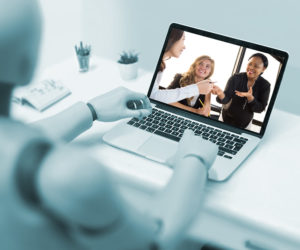How to Avoid Being Replaced by a Robot – Updated to Consider ChatGPT
by B. Kim Barnes
 In 2018 I wrote the following article:
In 2018 I wrote the following article:
Driverless cars. Smart stores. Bartenders, pharmacists, and journalists replaced by algorithms and machines. Attorneys and surgeons could be the next humans replaced by robots. Is this your future, too? What can humans do that robots can’t?
Humans can feel.
Humans can dream.
Humans can dance.
Humans can empathize.
Humans can influence.
Humans can lead.
Robots can be trained (or, in the future, train themselves) to do complex as well as simple tasks. They can learn from their mistakes. They can make decisions based on data. They can put objects or ideas together in unusual ways, mimicking human creative thinking. They can even be programmed to write passable poetry or music. But for the foreseeable future, at least, they won’t have human needs or emotions. They won’t hunger for relationships and experiences. They won’t fall hopelessly in love with a person or an idea. They won’t be driven to pursue a lost cause until it becomes a reality. They won’t burn the midnight oil arguing with friends who disagree until they don’t. They won’t move others to heal conflict, change minds, reduce fear, open hearts, experience joy.
So…how can you avoid being replaced by a sophisticated robot? Keep developing yourself as a communicative, influential, enthusiastic, imaginative, daring, humble, struggling, caring, fun-loving, curious, changeable, impassioned human being.
Now that ChatGPT has emerged as a widely available applied version of AI, there is a good deal of agonizing in the media about how to deal with the inevitability of being replaced. As I reread the article I wrote five years ago, I realize that we have some time left to be relevant. We can still do things that AI is not yet – or may never be – capable of doing. While ChatGPT is able to predict and describe, it is unable to explain. We can partner with it rather than being replaced by it. As the esteemed linguist, Noam Chomsky, wrote in a recent article in the New York Times:
“The human mind is not, like ChatGPT and its ilk, a lumbering statistical engine for pattern matching, gorging on hundreds of terabytes of data and extrapolating the most likely conversational response or most probable answer to a scientific question. On the contrary, the human mind is a surprisingly efficient and even elegant system that operates with small amounts of information; it seeks not to infer brute correlations among data points but to create explanations.”
Nonetheless, we need to use the time we have now to consider how we will create good and fulfilling lives without the urgency of work, should it come to that. We need to develop ways of creating a fair distribution of resources when salaries and fees for service are no longer the way we pay for what we need. Above all, we need to learn how to lead meaningful lives without the structures, benefits, and status now afforded to us by our job titles and the organizations we work for. That may be some time away, but by thinking about what we value and find joy in doing, we prepare for an uncertain future and, at the same time, a more meaningful and optimistic present.

Leave a Reply
You must be logged in to post a comment.